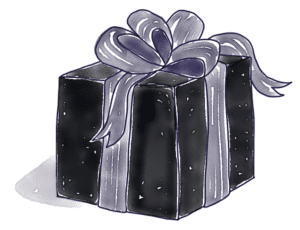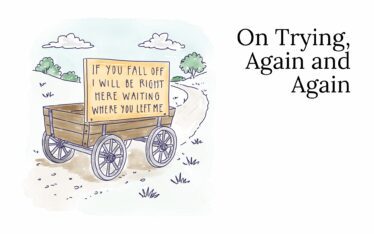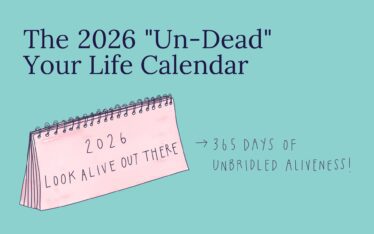Let’s be clear about this together, right up front: grief sucks.
I’m going to eventually say nice things about it, and lest I look like I’m trying to put a pretty bow on something so enormously vile, I want to agree with you that it does indeed suck. Other sucky things about grief:
Grief is unmooring.
I just found out that a dear client died yesterday, and the floor hasn’t felt steady since.
Grief is baffling.
I can’t make sense of it. How does a vibrant 42-year-old just… die? How can a human be here one day, and then not the next? I know better than to make sense of death but my meaning-making mind stubbornly won’t stop trying. “That’s just how it goes?” I ask, as though I’m five and don’t know how the cycle of life works. I STUDY DEATH FOR A LIVING AND I DON’T FUCKING KNOW HOW THIS GOES.
Grief can send you into the wilderness of despair.
If you’ve ever lost a loved one, you know how it feels to be dropped off in the tundra without a compass. I’m thinking of an article I read many moons ago about a man who said, “my heart just knelt down” after losing his family in an accident. I was surprised he didn’t say that his heart had been pulverized. I can only imagine how Chris-Tia’s family would describe how their hearts feel right now.
Grief is sneaky.
Grief makes you question reality, makes you somehow debate the truth that someone you had a session with on July 20th is no longer on the planet today. “But it was just a few months ago that we last met,” I argued to The Husband, as though the recency of our last conversation made her somehow impervious to death. “But she didn’t tell me the cancer came back… did I miss something?”
Grief is heavy.
And not in one of those comforting weighted blanket kind-of-ways. It’s like a heavy, itchy wool cloak you wear all day, even during the moment you share a silly laugh with a colleague on a zoom call — because the weight of the cloak insists you refocus on it and all its grievousness.
Some researchers have said that grief is a disease, because “… it represents a manifest and gross departure from the dynamic state considered representative of health and well being.” I suppose some develop the disease worse than others: 2 to 3% of people experience what’s called complicated grief — the fierce, drawn-out, life-impairing struggle of missing someone beyond comprehension. Bereavement is not for the faint of heart, is it?
The gifts of grief.
So far I’ve reinforced the bleak picture most of us have about grief: it sucks, it’s like a disease, and apparently some of us suffer mightily from loss for a bleak amount of time. But like most things in life, there are multiple truths going on at the same time. Grief sucks AND it has valuable gifts to offer — not wrapped all pretty, maybe just hastily thrown in a dollar store gift bag. But worthy gifts, to be sure.
Grief spikes our appreciation for life.
Studies on post-traumatic growth (yes, it’s a thing — we can experience positive changes in the face of loss, adversity, and challenge) consistently describe bereaved people waking up to life. In the aftermath of the initial grief shockwave, many report a heightened appreciation for the life they are still fortunate to have. A poignant reminder of how ephemeral we are can act as the jumper cables to live with more intention, vitality, and meaning. Has the passing of someone in your life helped open your eyes to what you have available to you? A precious life?
Grief can help us tap into our spirituality.
Many bereaved people experience a connection to something bigger than themselves — a transcendence that provides immense comfort. Some rekindle a dormant relationship with religion or seek a spiritual relationship out for solace. Is there a spiritual element you might want to enhance in your life, before you need it in a time of loss?
Grief casts a loving glow of legacy.
When someone in our life dies, we remember them (usually/ hopefully with fondness), and we remember them out loud. We attend memorials and we share stories about their character, their accomplishments, how they made people feel, how they lit up a room when they smiled, how they snorted when they laughed really hard. It’s special to reminisce. It’s important to commemorate the people in our lives who have died. I believe the tributes we pay are what solidify their legacies. I want to do a better job of memorializing the people I care about before they die. Can you do that, too? Let’s tell people why we’re proud of them, what we love the most about them, what the funniest story is about them, what we’d miss the most if they were suddenly gone.
Grief prevents us from taking things for granted.
When we see someone here one month and gone the next, we tend to look around and cherish the other people in our lives a heck of a lot more. Losing someone has a way of highlighting all that we have to lose. Sudden loss also makes us value the time we do spend with people. I wrote a note to myself last Friday night to reach out to Chris-Tia, and inexplicably she didn’t make it through the next day. I looked back on my to-do list today and felt spooked by seeing her name in my chicken-scratch handwriting. Why didn’t I reach out to her last month? Who do I need to reach out to today, before waiting until it’s too late? Who might I kick myself for not sending a silly text to, if they were to be wiped from existence next week? Who might you need to reach out to?
 Grief is multi-faceted. It’s shitty and serviceable at the same time. The next time it knocks on your door (because if you care at all about humans or animals, they will die on you, and oh shoot, of course this isn’t news to you), feel all the feelings and don’t forget to look for the value tucked under its cloak.
Grief is multi-faceted. It’s shitty and serviceable at the same time. The next time it knocks on your door (because if you care at all about humans or animals, they will die on you, and oh shoot, of course this isn’t news to you), feel all the feelings and don’t forget to look for the value tucked under its cloak.
I appreciate that this bright woman’s loss will lead to a healthy dose of memento mori (i.e.: remembering we must die, too). But for now I’m just really sad. As we agreed… grief sucks.







